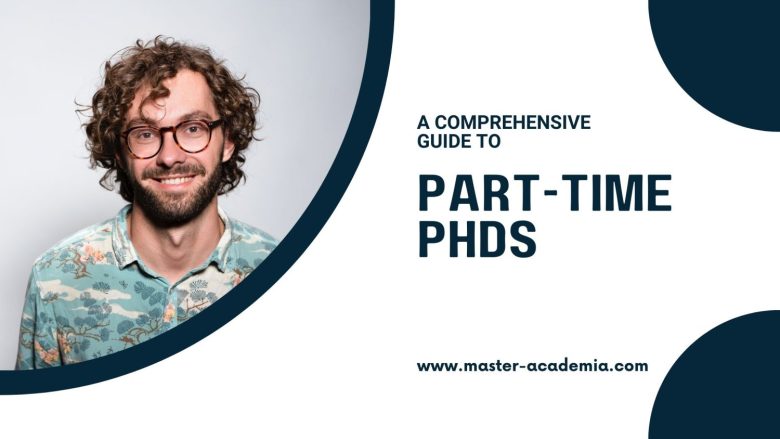
Doing a PhD part-time can be an attractive option for many reasons. However, part-time PhDs are less common than full-time ones, and there tends to be a lack of information on this option. This guide to part-time PhDs answers the most common questions that prospective part-time PhD candidates have.
Contents
- The difference between a part-time and a full-time PhD
- How much work is a part-time PhD?
- How long does it take to do a PhD part-time?
- Where is it possible to do a PhD part-time?
- Benefits of a part-time PhD
- Disadvantages of a part-time PhDs
- Is it worth doing a part-time PhD?
- Skills necessary for completing a PhD part-time
- Conditions for success in a part-time PhD
- Online part-time PhD programmes
- Ten questions to ask yourself before embarking on a part-time PhD
The difference between a part-time and a full-time PhD
The main difference between a part-time and a full-time PhD is typically the amount of time that a student spends per week on PhD-related tasks. The typical length of a full-time work week is five 8-hour days, comprising 40 hours in total. In some countries, this includes breaks. Thus, 38-40 hours/week can generally be considered full-time employment.
A part-time PhD carries fewer hours per week than full-time employment.
Precise definitions of part-time work differ. While some consider part-time employment as anything less than 38 hours/week, the OECD for instance defines part-time workers as those who work less than 30 hours/week.
Some universities have minimum requirements for part-time PhDs, for example, a minimum of 20 hours/week. Others, however, are more flexible. They allow part-time PhD candidates to spend anything between a few hours to several days per week on their part-time PhD studies.
Coursework that is required in PhD programmes is generally adjusted to part-time candidates and stretched over a longer period. The same is true for certain deadlines and comprehensive exams if required.
The degree that is awarded upon successful completion of a part-time PhD is the same as those being awarded for completing full-time programmes.
Most degree certificates don’t even mention that a PhD was pursued on a part-time basis. There is no reason to worry that a part-time PhD degree may be perceived as worth less than a full-time one.
How much work is a part-time PhD?
A part-time PhD requires pretty much the same amount of work as a full-time PhD. Part-time PhD programmes are spread out over a longer period, but the requirements in terms of credits and output (a monograph or cumulative dissertation) are usually the same.
Part-time PhD candidates are often highly aware of their time limitations. In turn, they may be better at utilizing their limited time during the week. For instance by minimizing procrastination, prioritizing tasks and making strategic decisions. However, this is difficult to generalise.
Part-time PhD students may be more inclined to work during evenings and weekends.
Other responsibilities during the ‘normal’ working hours result in less attention to PhD-related work. And sometimes, PhD work requires several hours of uninterrupted deep work.
In some cases, the lack of opportunities to focus on the PhD for a longer period can increase frustrations and stress levels. This is particularly true when part-time PhD students start together with a cohort of full-time PhD students and compare their progress with that of their full-time peers.
Ultimately, how much work a part-time PhD requires depends very much on a student’s research project, personality, efficiency, subjective perception of workload and stress, supervision, luck with experiments, and so on. This does not differ from a full-time PhD.
How long does it take to do a PhD part-time?
In most cases, a part-time PhD takes longer than a full-time PhD. A general rule of thumb is that the fewer hours someone spends on a PhD per week, the longer it takes to complete it.
The number of years that full-time PhD students take to complete a PhD varies. Some finish in three years. Others require four, five or more years. Thus, there is a huge variation in the time it takes to finish a PhD. The same is true for part-time PhDs.
There are also differences between universities. Some universities have a strict programme that takes, for instance, three years for full-time PhD students and six years for part-time PhD students.
Other universities adapt to the specific circumstances of individual PhD candidates. They may allow someone to finish a part-time PhD in three years as long as all requirements are met. But they may also be okay with a part-time candidate who spends a decade on his or her PhD studies.
Can you complete a part-time PhD programme? Yes, absolutely.
But due to the vast differences between universities as well as PhD programmes, it is essential to inform yourself properly before applying for a part-time PhD.
The regulations in terms of length of a part-time PhD have a major effect on a PhD trajectory, time planning, tuition fees if applicable, etcetera.
Where is it possible to do a PhD part-time?
There are plenty of opportunities to do a PhD part-time, but the specific opportunities and arrangements depend very much on individual universities.
Some universities advertise specific part-time PhD programmes on their web pages. Or, with a little bit of digging, provide information online for those who are interested in part-time PhDs.
For other universities, it is difficult to find any information on part-time PhD programmes online. This does not always mean that there are no opportunities. Sometimes, it requires sending emails to the admissions office, or contacting a potential PhD supervisor directly to ask for part-time possibilities.
There are also differences in national contexts. In some countries, for instance, in Germany, part-time PhD studies are often the norm. In Germany, many paid positions exist that encompass 60% of a full-time equivalent: time during which a PhD student is required to work in a lab or assist a professor. In the remaining 40% of the time, which is unpaid, a PhD student is expected to work on a dissertation.
In some other countries, PhD students tend to be employed in the public sector, receive a salary and make pension contributions. In those cases, they tend to fall under the same regulations as the non-academic workforce. This can mean, for instance, that they have the right to change their contract to part-time, for instance in the case of care responsibilities.
Benefits of a part-time PhD
There are many benefits to doing a PhD part-time. Some of the most common advantages are
- More secure finances: Many full-time PhD students experience financial insecurities because PhD scholarships are often not enough to cover living expenses, or do not cover the whole PhD trajectory. Part-time PhD students often work next to their PhD studies which provide additional income and a layer of financial security.
- Improved employability: This includes industry employability and employability in academia. Industry employability is enhanced if someone already gains substantial work experience outside academia, through working in a certain profession while doing a part-time PhD. Employability in academia is enhanced if someone already gains academic work experience (for example as a research assistant) and teaching experience (for example as a junior lecturer or teaching assistant) while doing a part-time PhD.
- Flexibility: Doing a PhD part-time tends to provide increased flexibility. For instance, students who have care responsibilities are more likely to be able to combine their PhD studies with their other responsibilities on a part-time basis.
- Efficiency: The advantage of many part-time PhDs is that they are very aware of their time limitations and force themselves to be strategic in their choices. Part-time PhD students also often benefit from existing work experience and tend to be a bit older than full-time students. Combined, they sometimes are more confident and struggle less with imposter syndrome. Since procrastination is essentially linked to a fear of failure, part-time PhD students on average may be more confident, suffer less from procrastination and are therefore able to work more efficiently.
Disadvantages of a part-time PhDs
There are also disadvantages and challenges in part-time PhDs. Some of the most common disadvantages of doing a PhD part-time are:
- Difficulty to maintain a work-life balance: ‘Getting it all done’ is always challenging. Adding a part-time PhD to existing tasks, activities and responsibilities can negatively affect a person’s work-life balance. Part-time PhDs frequently require multi-tasking, which can interrupt the flow of work and lead to mistakes. Furthermore, evenings, weekends and holidays may be the only times when uninterrupted PhD work for several hours or days is possible. When part-time PhD students are not very good with boundary setting, they can easily feel overwhelmed and as if they can never take a break.
- Tuition fees: While not all PhD students (regardless of whether full-time or part-time) have to pay tuition fees, many do. Tuition fees tend to be adjusted in part-time programmes. Nonetheless, paying tuition fees for several years can be a financial burden. In addition, part-time PhD students are not always eligible for all scholarships and funding opportunities.
- Less supervision: Part-time PhD students often work even more independently than their full-time counterparts. Of course, the amount of supervision differs for full-time PhD students as well. However, a simple reason for less supervision is simply that part-time PhD students are not always physically present in a lab or department. They have less spontaneous interactions with their supervisors and other professors. It reduces the opportunities to ask a quick question or get feedback on a small issue. Part-time PhD students may be more reliant on more formal, scheduled meetings every few weeks or months.
- Feelings of isolation: Part-time PhD students may feel disconnected and isolated due to a lot of independent work, less physical presence and opportunities to connect with colleagues and peers. Furthermore, part-time PhDs tend to be in the minority, as full-time PhDs are still more common. This means that part-time PhDs may feel misunderstood and have no one to share their unique experiences and challenges with.
Is it worth doing a part-time PhD?
Following your curiosities and researching a topic in-depth can be a wonderful thing.
Yet, the question of whether a PhD part-time is worth doing or not is difficult to answer. It depends on the unique situation and ambition of each person in question.
Some people embark on a PhD part-time to progress in their career. Some people hope for a financial reward after completing a PhD part-time. Some people intend to change careers and use a part-time PhD to start the process while still earning money in a different job. Some people look for a challenge and embark on a part-time PhD for self-fulfilment. Some people have no other option but to do a PhD part-time.
Every person has to decide for him- or herself whether it is worth it, sensible and feasible. The decision requires a lot of self-reflection, and financial and life planning.
The decision to do a part-time PhD should not be treated lightly.
Skills necessary for completing a PhD part-time
Completing a PhD part-time requires several skills. These skills can be learnt. However, a complete lack of these skills at the start of a part-time PhD will make the trajectory much more challenging.
First of all, part-time PhDs benefit from a high degree of self-discipline.
Those who struggle to motivate themselves and to get the smallest task done without any external pressure, might not be the best candidates for part-time PhDs. Part-time PhD work requires a lot of self-discipline as well as self-motivation.
Next, the ability to multi-task and keep a cool head in stressful situations is a big advantage for those who embark on a part-time PhD.
Stressing out easily and feeling easily overwhelmed with many tasks and deadlines, on the other hand, is counterproductive in a part-time PhD.
Furthermore, flexibility and the ability to adapt to different circumstances is pivotal.
Part-time PhD students tend to wear many different hats. They need to be able to switch between different roles and juggle lots of different tasks and responsibilities.
Additionally, not everything will work according to plan. Part-time PhD students have to accept that things do not always work out as expected and have to quickly adapt to new situations.
Lastly, the ability to work independently can make or break a part-time PhD trajectory. Working on a PhD part-time often means working from home, alone, without social interaction and constant feedback opportunities. Not everyone is cut out for this type of work.
Conditions for success in a part-time PhD
A fundamental condition for success in a part-time PhD is the selection of a fitting research topic.
As in any PhD, regardless of whether full- or part-time, a PhD student spends many waking hours on the topic. If the topic is not interesting to the PhD student, and he or she is not passionate about it, motivation to work on it will inevitably decrease over time.
At the same time, the most passionate and skilled PhD student may still struggle if the institutional environment and supervision are suboptimal.
A supportive institutional environment that assists, accommodates, and invests in part-time PhD students can make a world of difference.
Probably even more important than the institutional environment is a good relationship between the part-time PhD student and PhD supervisors.
The quality and quantity of supervision matters, but also the social compatibility between students and supervisor/s. Therefore, applying to a programme without having ever met the prospective supervisor in person is a risky business.
If a prospective PhD student intends to continue working part-time in a different job, all parties should be informed and agree with the arrangements. If there is a connection between the PhD topic and the job, some employers even enter a formal arrangement that allows the student to do PhD work during some ‘normal’ working hours.
Pulling off a part-time PhD without all parties approving, or even knowing about it, can create a lot of problems along the way.
Lastly, a certain degree of financial security is required. Of course, this depends on the unique financial arrangements made by a part-time PhD. However, if other work, scholarships or grants are not enough to cover living expenses during a part-time PhD, it is not advisable to embark on this journey.
Online part-time PhD programmes
While online, part-time PhD programmes were available before the Covid19 pandemic, they have become much more common in the last two years. There are some strong opinions when it comes to online, part-time PhD programmes.
Proponents of these online programmes highlight how they can help to create a more level playing field. It allows PhD candidates, for instance, to live in a low-cost living area, while following a PhD at a prestigious university in a high-cost of living area.
Opponents lament the decreasing quality of PhD supervision in online PhD programmes. Some argue that doing a PhD increasingly becomes increasingly financialised, with universities collecting tuition fees but not providing adequate support.
However, with everything, this is very difficult to generalise. It requires prospective PhD students who are interested in these programmes to inform themselves thoroughly and to decide on a personal basis whether an online programme is a good fit or not. Speaking with others who already do, or finished, online part-time PhD programmes might be particularly useful.
Ten questions to ask yourself before embarking on a part-time PhD
If you consider embarking on a part-time PhD, your decision can be supported by asking (yourself) the following questions:
- What is my motivation to do a part-time PhD?
- Am I passionate enough about my (potential) research topic to spend several years working on it?
- What are the potential advantages and disadvantages of doing a part-time PhD, and how can I mitigate the disadvantages?
- Do I have enough self-discipline and endurance to do a part-time PhD with limited supervision?
- Do I have the flexibility to incorporate potential coursework into my day-to-day agenda?
- How many hours/week do I want to spend on my PhD, and how many hours can I (afford to) spend on it?
- What are the part-time PhD regulations of the university/universities where I consider applying?
- Is the (potential) PhD supervisor a good fit, and does the institutional environment seem supportive of part-time PhD students?
- How can I finance the part-time PhD?
- What do I want to do after completing the PhD?



